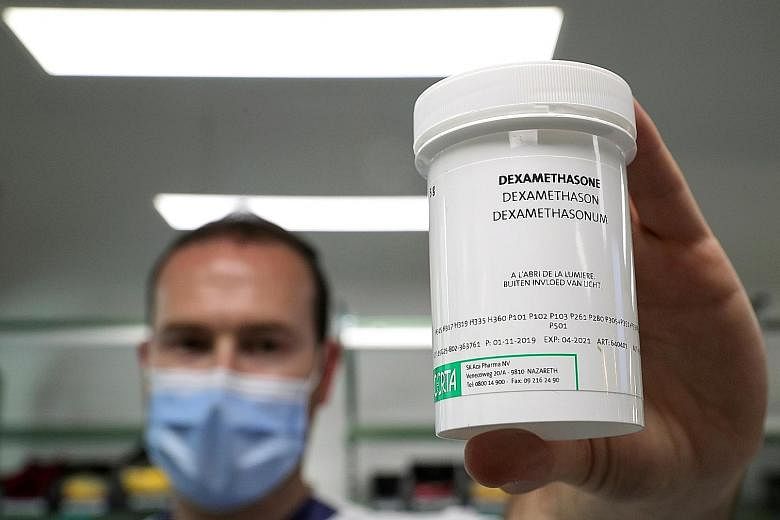Numerous Covid-19 drugs and therapeutics have come into the spotlight recently as medical experts search for ways to hasten a patient's recovery.
OXYGEN SUPPORT
Covid-19 triggers inflammation in the lungs and the possible formation of small blood clots, impairing the lungs' ability to take in enough oxygen for the body's needs.
Around 80 per cent of Covid-19 patients do not require supplemental oxygen. However, this proportion falls among older individuals and people who are obese - two groups for whom the disease is more severe.
When patients face respiratory failure, they may need oxygen support - which can include intubation and ventilator support in serious cases.
Dr Leong Hoe Nam, an infectious diseases expert at Mount Elizabeth Novena Hospital, said: "We tend to offer oxygen support when the levels fall to 91 per cent to 95 per cent."
Associate Professor Hsu Li Yang, programme leader for infectious diseases at the National University of Singapore's Saw Swee Hock School of Public Health, said: "If oxygen saturation falls below 90 per cent rapidly, most individuals will start to feel breathless and experience other symptoms like headache or disorientation. Prolonged and/or profound oxygen insufficiency will lead to organ damage and death."
ANTIVIRAL DRUG REMDESIVIR AND STEROID DEXAMETHASONE
Antiviral drug remdesivir, which was originally designed for Ebola, blocks the Covid-19 virus from replicating inside cells.
In trials conducted by manufacturer and drugmaker Gilead Sciences, the drug was shown to be generally effective, with patients with moderately severe illness - such as those requiring supplemental oxygen - benefiting the most from it, Dr Leong said.
Dexamethasone - an "old and cheap" drug used to treat severe asthma and severe allergic reactions - is a steroid that broadly suppresses the immune response of the body, Prof Hsu said.
"Most of the Covid-19 patients who become critically ill and die do so because of an aberrant immune response that leads to excessive inflammation in the body."
This happens because the hyperactive immune system damages cells and organs even as it attempts to eliminate the invading virus. Dexamethasone helps dampen this excessive immune response.
In a large clinical trial involving more than 6,000 Covid-19 patients, Oxford researchers showed that the use of dexamethasone resulted in fewer deaths in those requiring oxygen support or invasive mechanical ventilation.
Currently, both drugs are often used together to treat moderately or critically ill patients. However, Prof Hsu and Dr Leong also added that there are no large-scale clinical trials to show both can and should be given together.
EXPERIMENTAL ANTIBODIES COCKTAIL
This cocktail comprises two monoclonal antibodies: lab-created antibodies based on immune cells taken from convalescent patients - including three from Singapore - as well as mice engineered to have human immune systems.
With more antibodies targeting different sites on the virus, a cocktail would make it more difficult for the virus to mutate and escape the binding of the antibodies.
VITAMIN D
Multiple studies have suggested that having adequate amounts of vitamin D may play a role in helping people stave off or combat the coronavirus.
But there is still no clear understanding of the mechanism of action or definitive proof of clinical benefit in randomised clinical trials involving vitamin D, said Professor Paul Tambyah, president of the Asia-Pacific Society of Clinical Microbiology and Infection.
For instance, one study showed that patients with vitamin D deficiency and who were not given treatment for it were 1.77 times more likely to test positive for Covid-19 than those who were not deficient.
Other therapeutics have also been used to treat Covid-19, such as zinc, which has shown some antiviral activity in the laboratory, Prof Tambyah said.
TREATING SIDE EFFECTS AND COMPLICATIONS
Other medicines like famotidine are used to mitigate some of the side effects caused by drugs like dexamethasone, by protecting the lining of the stomach from ulcers.
Melatonin, a supplement used for jet lag, is also sometimes given to help patients deal with drugs like steroids that cause insomnia Prof Tambyah added.
Aspirin is also sometimes given to prevent blood clots that can cause strokes and heart attacks - a dangerous complication reported in Covid-19 patients.


